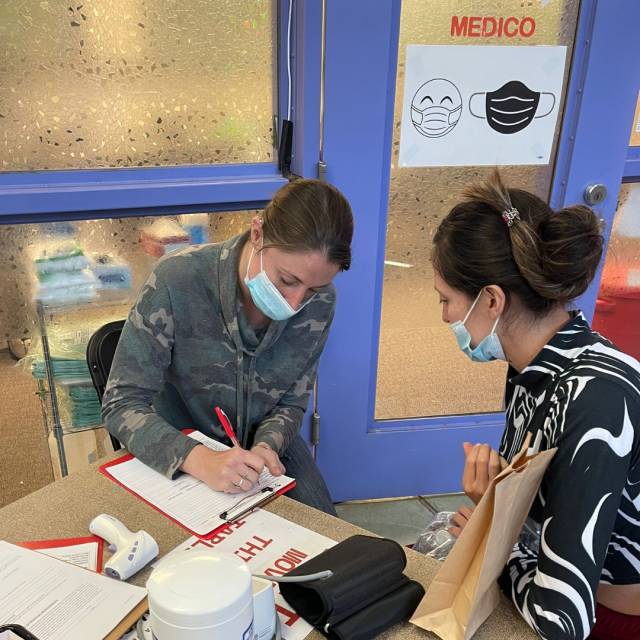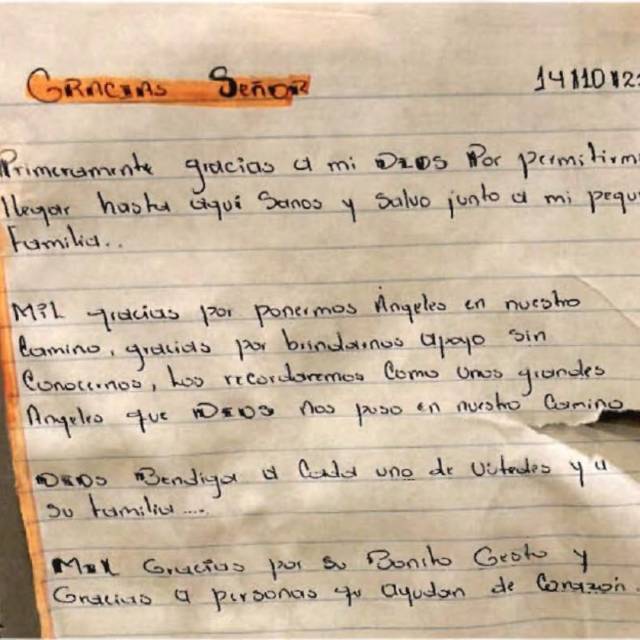You are here
Top Notch Support for New Arrivals
In January 2023, I visited the Casa Alitas shelter in Tucson, AZ, to learn more about their supportive work with migrants seeking asylum in the U.S. Soon after I arrived, a bus rolled onto the grounds, carrying 200 asylum-seekers who had crossed at the US/Mexico border. The passengers were greeted by friendly faces eager to help them process their asylum claims and connect them to additional support services for essentials like housing, employment, food, clothing and health care. The exhausted travelers—individuals, couples and families—had come a long way to seek protection in the U.S., and I sensed their relief at finally feeling safe and having their immediate needs addressed.
Among the greeters were staff from Southeast Arizona Health Education Center (SEAHEC), who provided access to important health information, including up-to-date details about COVID-19 and influenza vaccines. SEAHEC ensures that a physician is always present at the shelter to address immediate health needs and answer questions about vaccinations.
In addition to onsite physicians, SEAHEC’s well-trained Promotores, or community health workers, were present at the Casa Alitas shelter, to make a personal connection with every family there. Speaking with the new arrivals in their native languages, the Promotores ensure the asylum seekers understand where and how to receive COVID-19 and influenza vaccinations and answer any questions. All the Promotores are fluent in Spanish, with many having migrated from Spanish-speaking countries themselves. This cultural commonality helps them provide appropriate, sensitive health education. SEAHEC has hired Portuguese-speaking staff members, and the Promotores have become adept at using translation resources to support migrants speaking Russian, Hindi, Punjabi and Indigenous languages originating in South and Central American countries, among others.
When I watched the Promotores interact with asylum seekers, I was struck by how eager the migrants were to engage in conversation and receive health education. Typically, the Promotores can gain the migrants’ trust fairly quickly, perhaps a testament to the trauma-informed training that each SEAHEC staff member receives. The staff are also determined to answer migrants’ questions, even those unrelated to health. The Promotores never tell asylum seekers, “No” or “I don’t know.” If a service requested is outside SEAHEC’s scope, the Promotores connect the individual to a local partner who can help meet those needs.
SEAHEC began offering COVID-19 and influenza programming in June of 2021, as part of the CDC Foundation’s Partnering for Vaccine Equity program. In that time, SEAHEC has expanded and deepened crucial partnerships, developed hundreds of culturally appropriate communications materials, and notably, enabled more than 2,500 vaccinations against COVID-19.
When I visited the organization’s headquarters in January, I had the chance to meet with the staff, including a medical doctor named Susana. Susana’s commitment to her patients was evident right from the start. At the beginning of our meeting, she poked her head into the room and said, “I’ll be right back, there’s a patient who is really important to me.” It was heartening to see how much she clearly cared about the people she served, and I got the sense that every patient is really important to her.
I visited SEAHEC as a Program Officer working in the Partnering for Vaccine Equity program, and my time with the organization left me feeling hopeful and inspired. The staff members are wholeheartedly committed to achieving health equity and providing thoughtful, individualized services to asylum seekers who cross the border into Arizona. It was a wonderful reminder of the importance of well-grounded, community-based public health interventions, and an impressive example of community health work done right. I’m very proud to be a part of the CDC Foundation’s ongoing support of these efforts.
This project is supported by the Centers for Disease Control and Prevention of the U.S. Department of Health and Human Services (HHS) as part of a financial assistance award totaling $22,724,994 with 100 percent funded by CDC/HHS. The contents are those of the author(s) and do not necessarily represent the official views of, nor an endorsement, by CDC/HHS, or the U.S. Government.
Photos courtesy of Southeast Arizona Health Education Center


